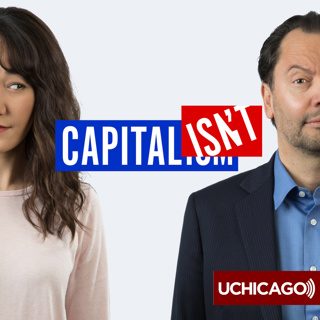
Pollution Pt 1: The Sticky Side of Teflon
In the first of a two-part series on pollution, Kate and Luigi discuss the health hazards and economic costs of air pollution and contaminated drinking water from the toxic chemical PFOA (C8) found in Teflon. How did DuPont skirt regulation and avoid corporate responsibility for so long?
31 Jan 201931min

Warrenomics
As Sen. Elizabeth Warren (D-Mass) jumps into the 2020 Presidential race, Kate and Luigi examine her legislative record and economic policy proposals, including several bold ideas to reform American capitalism.
17 Jan 201929min

Why Capitalism Needs Journalism
Pulitzer Prize-winning journalist Steven Pearlstein drops by to talk with Kate & Luigi about the incredible shrinking newspaper -- especially the business section -- and why that's bad for the economy. His new book "Can American Capitalism Survive?" argues that the mantra of “maximizing shareholder value” ultimately caused Americans to lose faith in the free market.
3 Jan 201934min

The Financial Assassin
Fahmi Quadir thinks short sellers get a bad rap. Known as the "financial assassin" for helping expose fraud and misconduct at Valeant, she tells Luigi that Tesla might be next. But Kate isn't convinced -- she thinks journalists and regulators are the real heroes.
20 Dec 201833min

Global Inequality Pt 2: Divergence
In the second of a two-part look at global inequality Kate & Luigi talk about the downside of globalization. A listener's email sparks a conversation about what's driving the growing wage gap within the U.S. We survey the latest research on the lingering effects of the 'China Shock' and debate how to reverse the trend before the people revolt.
6 Dec 201828min

Global Inequality Pt 1: Convergence
In the first of a two-part look at global inequality Kate & Luigi talk about the upside of globalization -- a decrease in income inequality between countries over the last few decades. How much of this can be attributed to China, and what was the secret to their success?
22 Nov 201829min

The People Vs. Democracy
Yascha Mounk talks with Kate & Luigi about his new book "The People Vs. Democracy: Why Our Freedom Is in Danger and How to Save It." Recorded in front of a live audience, the conversation touches on recent populist uprisings and the extent to which they threaten liberal democracy.
8 Nov 201832min

Brazil on the Brink
Populism strikes again as the world's 4th largest democracy is set to elect controversial right-wing politician Jair Bolsonaro as its next leader. Writer and lawyer Glenn Greenwald (now living in Brazil) tells Kate & Luigi how rampant corruption, violent crime and a struggling economy have given rise to yet another populist movement.
25 Okt 201832min






















